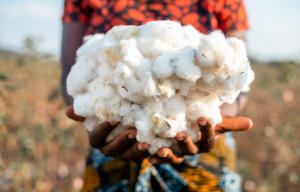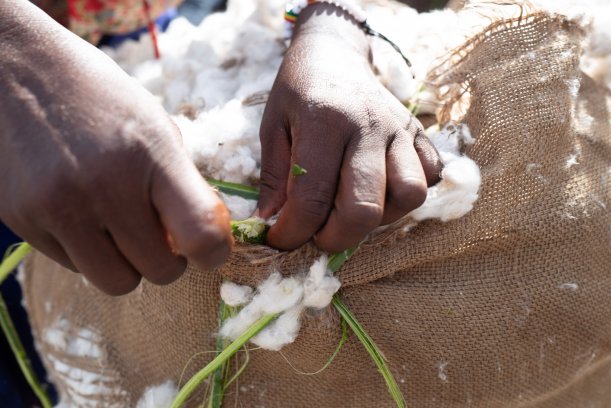
New partners for Cotton made in Africa
Record levels of supply and demand underline how widely accepted sustainable raw materials have become in international value chains.

26th May 2022
Innovation in Textiles
|
Hamburg, Germany
Cotton made in Africa (CmiA) has once again achieved record levels of supply and demand, with new and existing clients seeking to purchase greater amounts of cotton verified through CmiA and CmiA Organic.
A total of 600 million CmiA textiles were brought to market in 2021, more than doubling the volume from the previous year. In addition, the number of licensed retail and brand partners has risen by around 30% in the past four years and now encompasses some of the world’s biggest retail and fashion chains, including Bestseller, Lidl, LPP and the Otto Group.
The production of CmiA-verified cotton also grew by 10% to 690,000 tons, meaning that 40% of all cotton produced in Africa is now verified by the organisation, which is active in eleven countries and supports around one million small-scale farmers.
“This year’s record levels of supply and demand for Cotton made in Africa underline how widely accepted sustainable raw materials have become in international value chains,” says Tina Stridde, managing director of the Aid by Trade Foundation, which administers Cotton made in Africa. “Textile companies worldwide as well as cotton companies in all of Sub-Saharan Africa have joined our initiative as reliable and strong partners for small-scale farmers.
“Together, we have been able to ensure that CmiA and CmiA Organic cotton enjoy worldwide demand and are processed in over 50 textile production markets. By harnessing market forces, we are able to prepare small-scale farmers for the growing challenges of climate change and to build up their resilience through innovative and efficient farming methods.”
CmiA has also significantly expanded its textile value chain in recent years. In 2021, the network of registered partners grew to encompass 240 spinning mills throughout the world. The three foremost purchasers of CmiA cotton are Lidl Group, Otto Group and Ernsting’s family.
Cotton made in Africa follows a licensing model that requires all textile companies to pay licensing fees for verified cotton to the initiative, which reinvests the proceeds in cotton-growing regions in Africa. Some of these funds go towards regular certifications that are conducted at the field and ginnery levels by external auditors to monitor compliance with social, economic, and environmental sustainability criteria. External monitoring ensures that exclusion criteria – such as prohibitions on irrigation, child labour, genetically modified seeds and certain pesticides as defined in international conventions – are met, and that progress is made on improvement criteria that target issues including soil fertility and gender equality.
Licensing revenue also supports agricultural and business training for small-scale farmers.
The Aid by Trade Foundation is increasingly investing in measures for adapting to climate change and for reducing the impact of cotton growing and ginning on the climate. In one example, a carbon-neutral approach to cultivating CmiA cotton is being promoted in co-operation with atmosfair. In another partnership project, around €2.8 million is being invested in sustainable soil management.

Business intelligence for the fibre, textiles and apparel industries: technologies, innovations, markets, investments, trade policy, sourcing, strategy...
Find out more